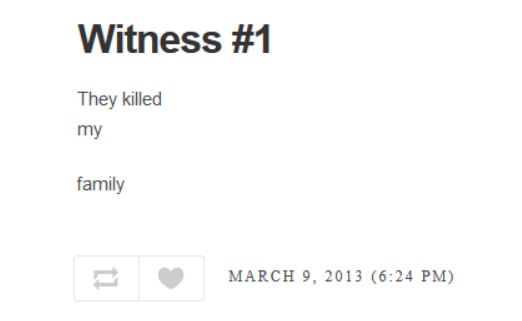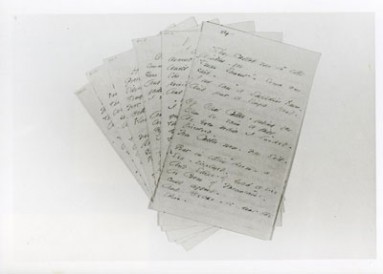The first entry in the ICC Witness Project begs the question that it is a poem:
This is not a poem that a New Critic would find pleasure in close-reading, no well-wrought urn. Lacking the type of formal complexity that tempts us to fetishize "the poem" as a qualitatively different event than a mere sentence in prose, it’s a simply devastating statement, the report of an event, worth noting primarily because of the interest that attaches to that event being described, and not to the form of its description. “They killed my family” is a painfully direct report of a horrific event, in painfully simple words.
This is the point at which the ICC Witness Project begins, the first in a series of lyric poems—though more below on calling the poems “lyric” —which were described by the project’s anonymous spokespeople as “a collaboration between Kenyan poets, in Kenya itself and in the diaspora,” which “aims to give voice to some of the missing witnesses for the ICC trial.”
The unnamed author of these words writes that:
“The work is inspired by, and is a response to, the below article”—“Claims of witnesses in Kenya ICC trial 'disappearing'” and quotes the following sentence from it: “What is clear is that alleged tampering with witnesses or those who may offer important leads about Kenya's violent past, is worrying the chief prosecutor at International Criminal Court (ICC) at The Hague. We want to make sure those who were part of the Post-Election Violence that rocked Kenya in 2008 are not forgotten…Submissions to the project and other comments can be sent to [email protected]”
The aspiration to “give voice” to silent or missing witnesses—to make sure that those who were part of a violent event are not forgotten—is a common, even conventional way to think about how literature becomes a human rights discourse, a familiar mode of liberalism in which “speech” is metonymic for personal agency, political participation, or civic inclusion. It has long been a tempting means of positioning scholarship as activism, or at least as socially useful. If the sign of repression and violence is the voicelessness of the subject, or the silencing of the subaltern, then to “speak back” describes an engagement with subalterneity. To speak for—or to speak with—is to align oneself with the victims of violence, to oppose their violation and to participate in some kind of reparative process of healing or political recovery. Participation in the process—whether by the scholarly work of bring testimonial to life, or simply by the witness of reading—comes to seem an active engagement. Going to see 12 Years a Slave, for example, is a step in a progress narrative by which we come to terms with the historical holocaust of racial slavery in this country.
There is a particular liberal politics embedded in the aspiration to give voice to the voiceless, in other words, or at a politics that is often ascribed and assumed for it. But there is also a substitution. When the subjects of violence are understood as silenced—and when that silence comes to seem co-extensive or necessary to their violation—then “speaking back” comes to seem like a form of agency, healing, or recovery, but only by rendering the violation co-extensive with silencing. I don’t want to under-stress the extent to which this might be true. But it can be easy to forget the extent to which it is not: if we come to terms with the historical holocaust of racial slavery in this country by making movies about that historical past—while movies like Fruitvale Station go unwatched, and unheeded—we have not only construed the legacy of racial slavery as a thing which has past, but have focused on it as a discursive problem of memory and history. Not, for example, as a problem of ongoing police brutality and social control, manifested in written and un-written police policies that routinely criminalize African-African men, under the name “stop-and-frisk” or otherwise.
“Interpretation” is also a form of substitution. If we take a text like the one above—if we call it a lyric poem, for example, and offer a “reading” of it—we are taking the event of a text which could occur in many different ways and contexts, and producing it in the particular form that “lyric” has come to reference. Whatever else it may be, it becomes lyric first and foremost.
Here, I’m calling on Virginia Jackson’s understanding of the the lyric as the development of particular reading practices in the nineteenth and twentieth centuries that become the practice of literary criticism, in the process retroactively transforming a great many poems into lyrics that originally were not so construed. Emily Dickinson’s fascicles are Jackson’s example, which have become lyric because they have been read as such: “to be lyric is to be read as lyric—and to be read as a lyric is to be printed and framed as a lyric.” Type-setting is ontology: how a text is printed and framed determines how it is read, and how it is read determines what it is.
The consequence of this understanding of the genre, however, is that a text which could be an undecidable and irreducible mixture of many different things at once, in its original iteration, instead comes to signify in much simpler, less ambiguous terms, the manifestation of a latent poetic meaning which it can then be the literary scholar’s work to interpret or draw out. This, too, is a reading practice which makes the lyric: if a text has been printed and framed as a lyric, it has become the container for a particular kind of meaning, its “form” the envelope in which the meaning is contained.
If we return to the first poem in the ICC Witness Project, I would suggest that these four words, three lines, two stanzas—which collectively become one poem—are such a painfully forced constriction of form to the production of a report—the fact that the speaker’s family was killed by “them”—that the poem collapses the very discursive structure through which we might, by calling it a “lyric,” attempt to understand and construe it. If “to be lyric is to be read as lyric—and to be read as a lyric is to be printed and framed as a lyric,” then printing and framing and reading this text in this way evacuates the act of doing so of any particular efficacy. It becomes, in the “new critical” terms with which I began, not a very interesting poem.
I begin with this reading because it frames the provocation with which the ICC Witness project begins, the limitation of “report realism.” What aesthetic, imaginative, and political possibilities get foreclosed by the imperative to report, and if we name that foreclosure the space of the poetic, what kind of poetic practice might help to open it up?
I take the term “report realism” from something Keguro Macharia wrote on his blog in 2012, the observation that
“Over the past 15 years and more specifically the past ten years or so, Kenyan writing has been shaped by NGO demands: the “report” has become the dominant aesthetic foundation. Whether personal and confessional or empirical and factual or creative and imaginative, report-based writing privileges donors’ desires: to help, but not too much; to save, but not too fast; to uplift, but never to foster equality…The believable and the realistic are bounded by NGO narratives and perspectives. And too many writers believe that the only writing worth anything is the believable and the realistic: to be a “committed” writer requires adhering to report realism. Report realism believes in the power of “truth,” whether contemporary or historical, with a faith that borders on fundamentalism. In report realism, the truth will set us free. Report realism confirms objective NGO reports and affirms what Kenyans feel to be the truth of a particular condition.”
Yet if report realism is the literary’s aspiration to the status of the report—the manner in which the work of literature is to give voice to the silenced, to shine a light in dark corners, etc—it is worth noting that “reports” often don’t want to be reports. The following language from the Report of the “The Truth, Justice and Reconciliation Commission of Kenya” which was established by an Act of Parliament in 2008 “to investigate the gross human rights violations and other historical injustices in Kenya between 12 December 1963 and 28 February 2008” but which flags the inadequacies of its genre in some really interesting ways, here:
“This is a Report. It is written with words, and printed on paper or converted into electronic bits and bytes. Yet it is the product of, in some cases literally, the blood, sweat and tears of the stories that were told to us as we travelled the country. The written word, no matter how poetic, cannot convey accurately the passion with which people demanded to tell their stories and the integrity and dignity with which they related their experiences. It cannot convey the silence, the tears, and the emotions that engulfed the venue at which a man described how he lost his entire family during the 2007/2008 Post Election Violence (PEV). It cannot convey the traumatic experience of a woman who was raped during the PEV and her fear that the same could happen to her during the 2013 elections. Nor can it convey the horrid experience of a woman who had to carry the head of her slain husband all the way from Nakuru to Kisumu. It can neither convey the tears that were shed before this Commission nor the tears that were shed by the Commission’s staff and Commissioners.” (my bold)
This is a work in progress, both a part of a first draft (for this talk) and a bit of exploratory writing, to--in a burst of modest idealism about Scholarly Community--open up the process of writing a bit to see what happens. Any and all comments and thoughts will be gratefully received.
Some questions I'm working through:
- The difference between a suppressed story and a story for which no infrastructure exists: no site for it to be told, or vocabulary in which it can be.
- Where does silence happen? Does it happen in the voice—such that giving voice can be a solution—or does it happen in the vacuum in which sound cannot circulate?
- What does it mean to present a poetic text as radically open-ended in this way? A “book” of poetry in which the reader is invited to become writer of the very text she is reading
- Oren Izenberg, On Being Numerous: "For a certain type of modern poet, I will argue, “poetry” names an ontological project: a civilizational wish to reground the concept and the value of the person."
- Poetics is a different form of human rights discourse than narrative, requiring an alternate mode of theorizing than that which has grown up around the novel (Joseph Slaughter)

